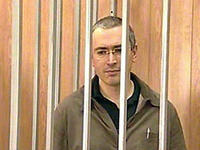Khodorkovsky,
however, does have a problem. While being free he did not show a
slightest sign of attraction to the left ideas. The disgraced oligarch
expressed left views only after he had found himself in jail.
Undoubtedly, it all turned out to happen in the manner of an old
Russian tradition: having gotten into jail, the former magnate starts
to think about life, feel guilty, and, ultimately, becomes a new
person. However, the text published in Vedomosti under the title “The
Left Turn” did not provoke enthusiasm among leftists. Some time passed
and brought the sequel “The Left Turn 2”.
The first thing which strikes you is that the articles about his ‘left
turn’ Khodorkovsky prefers to publish in the right editions or business
press. He doesn’t know that other options exist and doesn’t have his
thinking tuned this way. Khodorkovsky’s ‘left views’ actually almost
fully doubles his never existing interest to the left ideas. The real
left forces in Russia and in the world are of no particular interest to
him, that is why especially grotesque impression is made in the second
article. First of all, the author raises a question if there are
“modern, competent opposition forces in Russia today with leftist or
left-liberal views?” (“Kommersant”, 11.11.2005, № 212) Then he easily
leaves that question without an answer and passes on to other topics.
What seems to be more important to Khodorovsky is how to overcome
structural crisis of the Russian economy. Firstly, the government
should spend more money from the stabilization fund. This source could
be used for financing the transition from the “‘oil pipeline economy’
to the “economy of knowledge’”. Secondly, it is essential to instigate
the increase of the Russian population, but in such way that we could
do without the immigrants (taking measures stimulating the birth rate).
Thirdly, a special compensatory (windfall) tax should be imposed,
through which the ruling class will pay the people off, giving out the
compensation to the society for injustices of privatization. There are
more suggestions to follow, but trivial as they are, they are not worth
reviewing.
At first sight, Khodorkovsky’s ideas look attractive enough, though
there is nothing ‘left’ to them. It’s a list of measures, which are to
be carried out by the responsible liberal government. On taking a
closer look, however, it becomes obvious, that the program is utopian.
Here’s how Khodorkovsky sees the new structure in national economy: “40
percent is “economy of knowledge”; the other 40 percent is oil, gas,
metal, licensed production; and 20 percent is agriculture, including
processing and trade”. Easy to see that this scheme has no room left
for the industry. It is clear that the author supports himself by the
modern information society theories, but the problem is these theories
don’t work. Every ruler in the West is aware, that the true pillar for
the “economy of knowledge” is strong industrial sector. Though having
moved sections of production process to the Asian countries, the
Western companies still go on creating and sustaining the industrial
potential within the corporation. The “knowledge” is demanded only as
long as industry, which thirsts for it, exists. A country without its
own industrial potential will supply foreign countries with cheap
knowledge exactly the same way as it has done with the raw materials.
In economic terms, though, the raw materials economy without industry
is certainly more profitable, then expensive and vulnerable “economy of
knowledge” without industrial sector.
Khodorkovsky’s plan to increase the population of Russia does not stand
any criticism. The increase in living standards level does not
necessarily lead directly to the increase of population, otherwise, we
would have the Swedish and the Finn population all over the world,
instead of the Chinese and the Hindu. If things go on well so far, the
birth stimulating process will only lead to the stabilizing population
at the 140-150 million people level and stop the depopulation of
Russia. Actually, there is nothing terrible if the number of people
stays the same. Anyway, this is what we have to choose: either consider
the existing number of population, or strive for 220-240 million adding
people through the tools of immigration policy.
As far as the “legitimizing” of the privatization results through a
special compensatory tax, here Khodorkovsky is making a bigger mistake.
It is unclear, why we should be satisfied with the fact that a small
amount of what had been stolen from us is back. And, finally, here’s
the main thing. “The Left Turn 2” author has avoided the question about
moving forces of changes. Just imagine an utopian scenario: Putin takes
Khodorkovsky away from Siberia, makes him a prime minister, gives him
large powers and goes to Germany to rest. Unless you believe in it, it
becomes clear that Khodorkovsky’s plan will not be realized and applied
to practice. The left turn is impossible without mass movement and new
political forces taking over. If there is no rise in the mass movement,
if these forces fail to form, then talks about whatever ‘turn’
automatically become senseless. But if things go differently, if we see
an upsurge of the mass opposition and formation of the serious radical
political movement on the left, then Khodorkovsky and his plans will be
out of place.
I pity “The Prisoner № 1”, as Khodorkovsky was labeled by the press.
It’s bad when a person is deprived of freedom. However, the major
problem is not only about the former YUKOS owner not having the
possibility to move. He didn’t earn the intellectual liberty and acted
like the slave of the right liberal ideology. That is why there is no
spot to drive at. Staying at one spot, Khodorkovsky made two left turns
one after another, having returned to his starting point, which is on
the right side.
Boris Kagarlitsky is a Director of The Institute for Globalization Studies.
November 18, 2005 http://www.eurasianhome.org/en/?/en/comments/index
 Boris Kagarlitsky
Boris Kagarlitsky